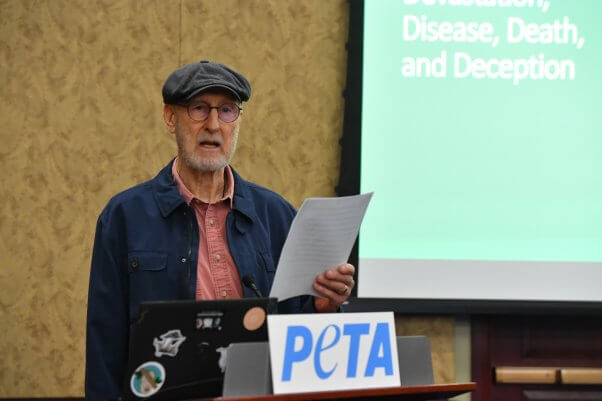
[ad_1]
PETA Honorary Director James Cromwell joined experts to speak at a congressional briefing, sponsored by Rep. Brian Fitzpatrick (R-PA), co-chair of the Congressional Animal Protection Caucus, on the deadly and deceptive monkey-importation industry. This “monkey business” is not only cruel to the more than 20,000 monkeys who are taken from their homes and subjected to horrific experiments but also risks contagious disease outbreaks in humans, threatens endangered species, and fails to move U.S. science forward.

“There are thousands of monkeys being torn from their families in Asia, confined in wooden boxes, transported for thousands of miles across country borders, and then confined again—this time in laboratory cages in the U.S.—and subjected to horrific and pointless procedures. Some of these monkeys have been abducted from their native forests, some were born at filthy breeding facilities. All of them suffer.” —James Cromwell
What Did PETA Cover at the Congressional Briefing About Monkeys?
Every year, tens of thousands of monkeys from Cambodia, Indonesia, Mauritius, and Vietnam are imported into the U.S., where they’re confined to laboratory cages, mutilated, poisoned, starved, infected with painful diseases, and killed. Not only is this cruel, it also presents grave risks to the public, and among the speakers who made this known to Congress were SUNY Upstate Medical University bioethicist Dr. L. Syd M Johnson, PETA primate scientist and former University of Washington monkey researcher Dr. Lisa Jones-Engel, and PETA neuroscientist and former National Institutes of Health researcher Dr. Katherine Roe.

The speakers presented evidence on the topics below.
- Disease risk: The number of monkeys coming into the U.S. and carrying dangerous diseases transmissible to humans has increased over the past three years. A recent tuberculosis outbreak in a Michigan laboratory, requiring treatment for humans, was traced to monkeys imported from Mauritius.
- Monkey trafficking: The U.S. Department of Justice has indicted Cambodian officials for selling wild-caught monkeys as captive-bred, which is a violation of federal laws. Virtually every monkey importer in the U.S., including Charles River Laboratories, is currently under investigation for alleged violations of monkey-import laws.
- Species under threat: The International Union for Conservation of Nature has elevated the status of long-tailed macaques, the species most commonly imported into the U.S., to “endangered” and cited demand from laboratories as the primary cause for their plummeting numbers.
- Domestic transport violations: State documents obtained by PETA reveal that monkeys are routinely trucked across the country without required veterinary exams, risking human health.
- Animal welfare violations: For years, federally funded primate laboratories, including the seven national primate research centers, have been cited for multiple violations. Monkeys in U.S. laboratories have been administered the wrong medication, denied adequate pain relief, and scalded to death in high-temperature cage washers; researchers have left gauze and medical equipment inside them; and they have died of starvation and dehydration, among other horrors.
- Failed science: Experiments on monkeys have failed to produce vaccines for HIV, tuberculosis, malaria, and other dreaded human illnesses.
Speakers at the Congressional Briefing Demanded Change—You Can, Too
The speakers called for the Centers for Disease Control and Prevention to end the importation of monkeys; implement PETA scientists’ Research Modernization Deal, which provides a strategy for replacing experiments on animals with superior, human-relevant research; and support the Cease Animal Research Overseas (CARGO ) Act, which would prohibit the National Institutes of Health from funding experiments on monkeys and other animals in overseas laboratories.
Join us in calling on Congress to end monkey importation and get U.S. research policy on the right, human-relevant track:
[ad_2]
Source link

Leave a Reply